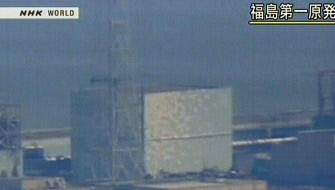TOKYO, March 15, 2011 (AFP) - Radiation levels near a quake-hit nuclear plant are now harmful to human health, Japan's government said after two explosions and a fire at the crippled facility Tuesday.
The crisis at the Fukushima No.1 plant, local 250 kilometres (155 miles) northeast of Tokyo, has now spread to four out of its six reactors following Friday's quake and tsunami which knocked out cooling systems.

"There is no doubt that unlike in the past, the figures are the level at which human health can be affected," said chief government spokesman Yukio Edano.
Tens of thousands have already been evacuated from a zone within a radius of 20 km from the ageing plant, but Prime Minister Naoto Kan urged people living within 10 km of the exclusion zone to stay indoors.
Early Tuesday a blast hit the number-two reactor there. And Edano later said there was also an explosion which started a fire at the number-four reactor.
Although the number-four was shut for maintenance when the quake and tsunami struck last Friday, "spent nuclear fuel in the reactor heated up, creating hydrogen and triggered a hydrogen explosion".
He said radioactive substances were leaked along with the hydrogen.
"Please keep in mind that what is burning is not nuclear fuel itself," Edano said. "We'll do our best to put out or control the fire as soon as possible."
Media reports said the fire was apparently extinguished later in the morning. The plant operator could not immediately be reached for confirmation.
Similar hydrogen blasts had hit the number-one and number-three reactors on Saturday and Monday.
Edano said radiation levels as of 10.22 am (0122 GMT) were 30 millisieverts between the number-two and the number-three reactors, 400 millisieverts near number-three and 100 millisieverts near number-four.
A single dose of 1,000 millisieverts -- or one sievert -- causes temporary radiation sickness such as nausea and vomiting. A dose of 5,000 millisieverts would kill about half those receiving it within a month.
Edano said radioactive substances might spread outside the 20-30 km area but would dissipate the farther they spread.
It was still unclear whether the container sealing the number-two reactor had been breached.
The plant operator initially told the nuclear safety agency that it had not been holed, but later told AFP it was still checking for any breach.
The UN's nuclear watchdog, the International Atomic Energy Agency, said Tokyo had asked for expert assistance in the wake of the disaster caused by a quake now measured at 9.0-magnitude.
Officials have struggled to prevent meltdowns at the damaged reactors, saying fuel rods may have been critically damaged by overheating.
A meltdown occurs when fuel rods melt at extremely high temperature, creating the potential for an explosion that breaches the reactor and spews large amounts radioactive material into the air.
But authorities have not reported the kind of radiation leakage that would accompany a major meltdown.
The continuing nuclear crisis has unnerved regional residents already struggling with the aftermath of the quake and tsunami.
"There are very few people out in the streets", said Mako Sato, a cafe waitress in the town of Miharumachi just outside the evacuation zone. "They are either staying at home or in the evacuation centres.
"Since conditions surrounding the nuclear plant are so uncertain, I am worried. Food supplies are low and all that customers talk about is the quake and how scary it is, because we still feel aftershocks."
An employee at the Hotel Chisun in Koriyama said there were no visible signs of panic despite the nuclear crisis.
"Everyone is reacting calmly. But due to safety concerns after the quake we aren't accepting new business," the employee said. "
"There is very little food and convenience stores nearby are all closed. We are doing the best we can with our reserves."
























